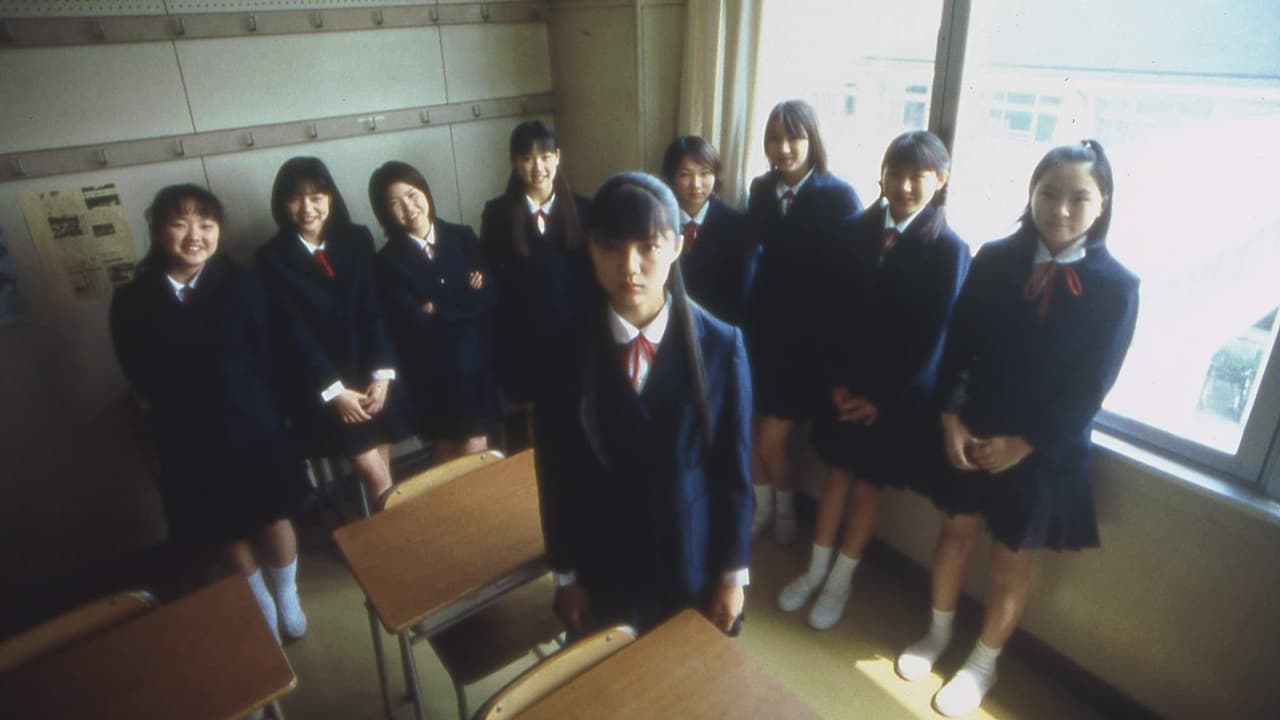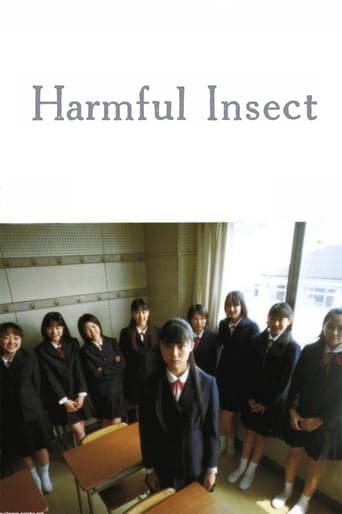

Aoi Miyazaki plays a thirteen year old girl whose mother attempts suicide after her father abandons the family. Her classmates gossip in the bathrooms about a supposed affair she had with her sixth grade teacher. She skips school and her only friend is killed by a gang. Her mother's new boyfriend attempts to rape her. It's seems awful to take such a cute and accomplished young actress and punish her for ninety minutes and call it a film, but it's the strength of Miyazaki's performance that makes Harmful Insect such a powerful and haunting experience.I was furious and hated this movie five minutes after it was over. It had seemed slow and unfocused and the ending, awful. I still think it's an unpolished film, not that attractive to sit through, but I have a better appreciation for the vision of it after being unable to not think about it for a while. I won't say exactly what the ending is, but it has to do with the sixth grade teacher who leaves the school and goes to work in a nuclear power plant amidst the rumors of a relationship with Miyazaki's character. The film is punctuated throughout with screens of written correspondence between the teacher and Miyazaki. It's not definitive that there was a sexual relationship and the ambiguity is important. That the two of them actually correspond is telling.One of the best scenes in the film is when Miyazaki's character is talking with a classmate she has started going out with. We've seen them innocently kiss and we see this as a first step, perhaps, in her trying to re-assimilate into a normal middle school life. The two characters are in an classroom, empty of people but full of desks. The boy inquires about the rumors surrounding her relationship with the teacher. Miyazaki, without hesitation, gently pulls one of the desks from the back of the room to the front, knocking it into rows of desks and chairs as she exits. It's an outstanding scene and really highlights how well this sixteen year old actor is able to internalize her character's angst and scream it out loud without making a sound.I can't say enough about how good Miyazaki's performance is. I've mentioned how relentlessly her character is punished throughout the film. The amazing thing is how quietly and resigned, how maturely and almost positively, she responds to all of it. Her alienation is palpable and yet she wanders through the film with such strength of character it's mesmerizing.I still don't think the film is assembled very well. If it weren't for Miyazaki's performance it would be difficult to engage. The lack of a traditional flow of ideas seems crass, too challenging for its own good. The exaggerated level of her abuse, coupled with her transcendent response to it, still makes me question the director's choice for the ending. It comes off like another slap in the face, a misguided attempt to inflict more pain in the viewer's heart when something, anything, would have been more appropriate for the character. Ultimately, however, I guess it is the organic summation of the vision that the director set out to explore: bad things happen to good people and the alienation of youth is a train wreck of self-multiplying disasters that once begun is impossible to stop. It's a shame that redemption is withheld from a character so deserving of it.If you are a fan of Aoi Miyazaki you need to see this film just to see what she was capable of at age sixteen. It's pretty powerful.
... View MoreThose expecting Shiota Akihiko's emotionally charged "Gaichu" to end with a happy resolution will be in for quite a shock. "Gaichu" takes a stark, cold look at the life of a 13 year old girl Sachiko (played admirably by a young Miyazaki Aoi of "Nana" fame) and follows her sad life as it spirals out of control. One can only feel a great sense of loss and pain as we watch helplessly as Sachiko makes all the wrong decisions in her young life. The film is a companion piece to Nakashima Tetsuya's recent "Kiraware Matsuko No Issho" which also told the story of a young woman who fate seemed determined to undermine at every turn. While "Gaichu" is a sad film, it is never depressing to the point of being unwatchable. There are brief moments in Sachiko's life where she is happy and finds support (through her lone friend Natsuko--played by fan favorite Aoi Yu) and even finds love. Yet, these moments are crushed by both unfair twists of fate (being almost raped by her mother's lover, having her "street" friend leave her) and bad decisions on her part (mistakenly burning her home, leaving her boyfriend when he questions her about her past).While it is not as powerful a film as Koreeda Hirokazu's haunting "Dare Mo Shiranai" or Larry Clark's shocking "Kids", "Gaichu" really makes an emotional impact. Sometimes, we are so caught up with our own busy lives that we forget to talk with our children and be there to listen to them. This film acts as a warning for the consequences for not doing so.
... View MoreGaichu a/k/a Harmful Insect (Akihiko Shiota, 2001) (spoilers)One of my all-time favorite films. It is also one of the most emotionally devastating films I've ever seen. This follows part of a year in the life of a bright, musically talented (and innately cheerful) girl -- during which her world falls apart. The heroine Sachiko (played by Aoi Miyazaki, who was so haunting in "Eureka" a couple of years earlier) is betrayed by the society around her. First (before the film starts) her father abandons her and her mother, then (seen in flashbacks -- the school year prior to the film) a young teacher she depended on fled to a non-teaching job in Northern Japan (it is unclear whether the teacher "took advantage" of Sachiko, though I prefer to think not), then at the outset of the film, her mother tries to kill herself (having been dumped by a new boyfriend). Sachiko feels increasingly uncomfortable at school, due to the gossiping of her classmates, and starts "skipping out". While _not_ going to school, Sachiko meets a young drifter and drop-out (who makes a living of sorts by pretending to get hit by people driving expensive cars). They have a brief idyll -- until he runs into some gangsters who beat him savagely (presumably for not paying protection money). After this friend disappears, Natsuko, her best friend from school, convinces her to return to school and does her best to provide some emotional support. This "recovery" begins to falls apart when another new boyfriend of her mother tries to rape Sachiko -- and her mother is so crushed more by the loss of yet another man that she can do nothing to console her daughter. Then Natsuko and Sachiko fall out over the fact a boy Natsuko likes begins to take an interest in Sachiko -- and Natsuko (apparently) gossips to the boy about Sachiko's "past". Things get worse -- explosively worse -- after this. Unlike Bresson's self-destructive heroines (to whom Sachiko has been compared), Sachiko never gives up. If one believes the maxim "where there's life, there's hope" -- one can at least hope there is hope at the end of this harrowing film.
... View MoreHarmful Insect is one of those magnificent films that makes the most extreme behavior comprehensible. It's a portrait of intense alienation, centering on a seventh-grade school-girl. Sachiko lives her life surrounded by adults who are at best ineffectual and at worst (and they are very often at their worse) predatory.Director Akihiko Shiota does not shy away from the dark, but the film is neither exploitative nor gratuitously gruesome. It is bleak and powerful, and the moments of hope, happiness, and humor stand out all the brighter for the vividness with which Sachiko's psychological isolation is portrayed.
... View More